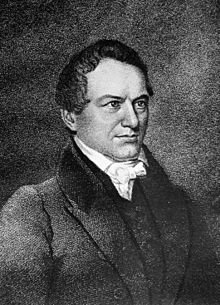Robert Young Hayne
Robert Young Hayne (born November 10, 1791 in St. Paul's Parish , South Carolina , † September 24, 1839 in Asheville , North Carolina ) was an American politician and governor of South Carolina from 1832 to 1834 . He also represented this state in the US Senate .
Early years and political advancement
Robert Hayne was first taught privately and then studied law. In 1812 he was admitted to the bar. In the war of 1812 he served in various units and rose to captain. His political ascent began with his election to the South Carolina House of Representatives in 1814. He held this mandate until 1818, during the last year he was Speaker of the House. From 1818 to 1822 he served as Attorney General of South Carolina. For the next ten years until 1832 he was a Senator for various parties in Congress in Washington, DC There he was chairman of the Naval Committee. His fundamental debate with Daniel Webster about protective tariffs and the rights of the individual states is also noteworthy . That debate took place in January 1830 against the backdrop of the looming nullification crisis in South Carolina.
Governor of south carolina
In late 1832, Hayne was elected governor by the state parliament to succeed James Hamilton Jr. He took up his new office on December 13, 1832. When he took office, the nullification crisis was at its height. Like his predecessor, Hayne was convinced of the correctness of South Carolina's position. He fully endorsed the decision to repeal South Carolina’s federal protective tariff law of 1832. He called about 10,000 men to arms in order to counter a possible invasion by federal troops . For his part, President Andrew Jackson was also ready to argue. The question of leaving the Union was seriously debated in South Carolina; however, there were no other southern states that wanted to join such a project. The crisis was eventually resolved through a compromise by Henry Clay . The problem continued to exist subliminally and later, during the discussion about the question of slavery , it became topical again. Finally, all tensions discharged from 1861 in the civil war . Governor Hayne could not be re-elected immediately after the end of his two-year term because the constitution did not allow two consecutive terms.
Further career
After retiring from governor's office, Hayne was mayor of Charleston from 1835 to 1837 . He was also president of a railroad company and promoted the construction of a railroad that would connect South Carolina with the Ohio Valley . However, this plan failed due to the economic crisis of 1837 for financial reasons.
Web links
- Robert Hayne in the National Governor Association (English)
- South Carolina Information Highway (English)
- Robert Young Hayne in the Biographical Directory of the United States Congress (English)
- Robert Young Hayne in the database of Find a Grave (English)
| personal data | |
|---|---|
| SURNAME | Hayne, Robert Young |
| BRIEF DESCRIPTION | American politician |
| DATE OF BIRTH | November 10, 1791 |
| PLACE OF BIRTH | St. Paul's Parish , South Carolina |
| DATE OF DEATH | September 24, 1839 |
| Place of death | Asheville , North Carolina |


